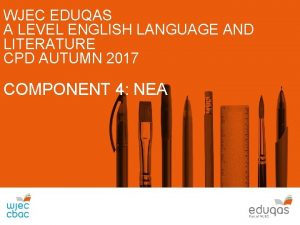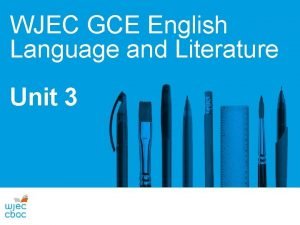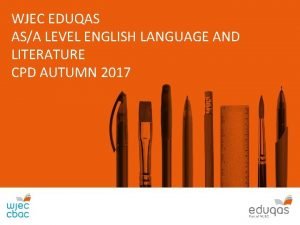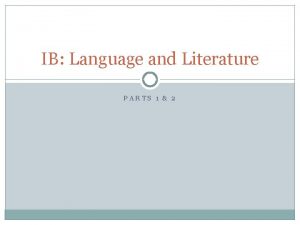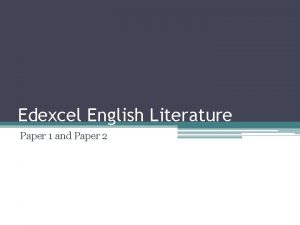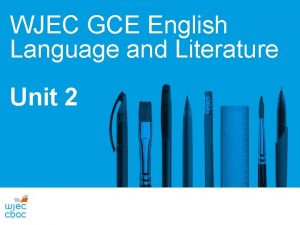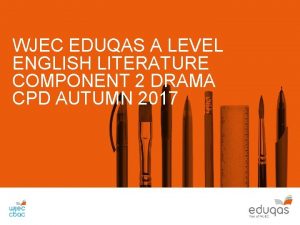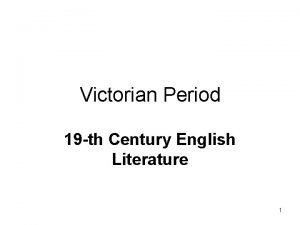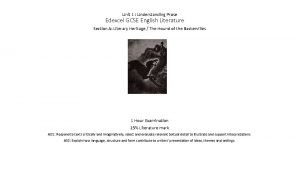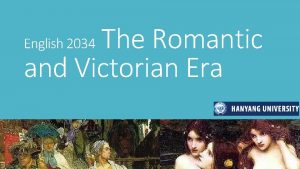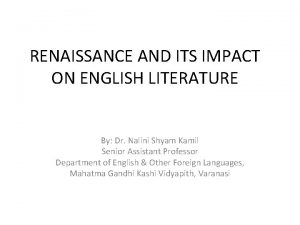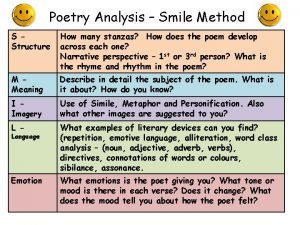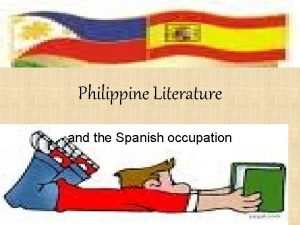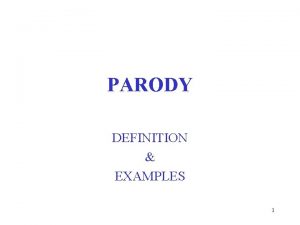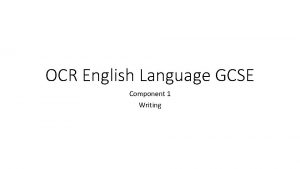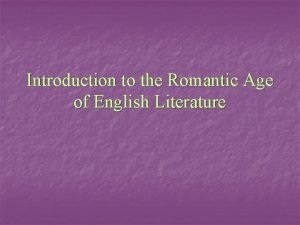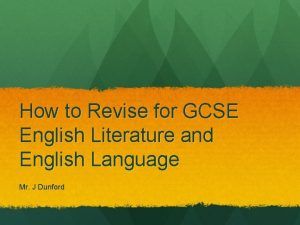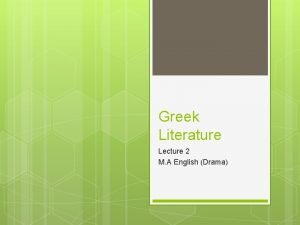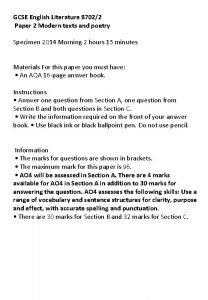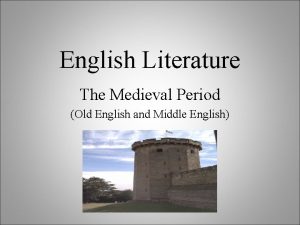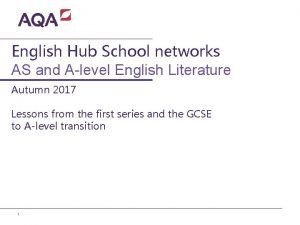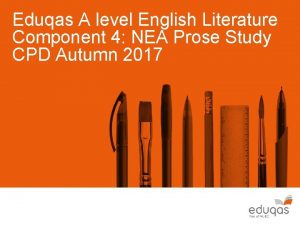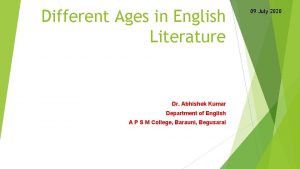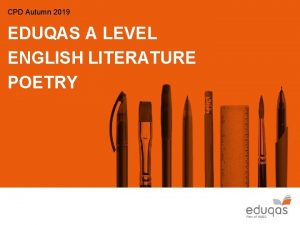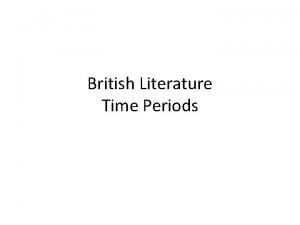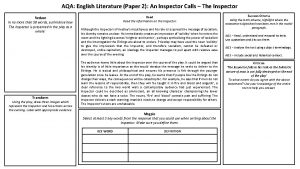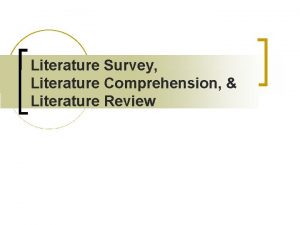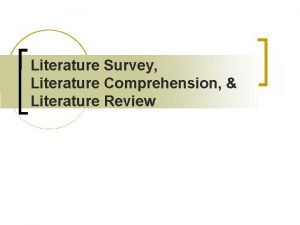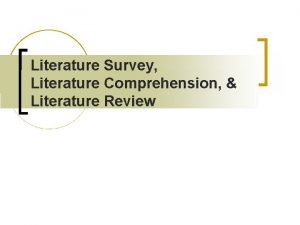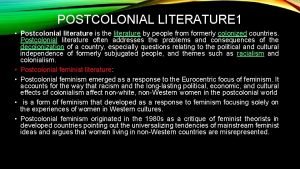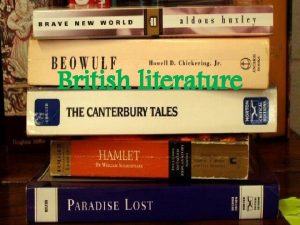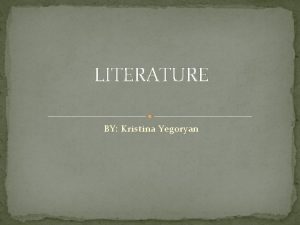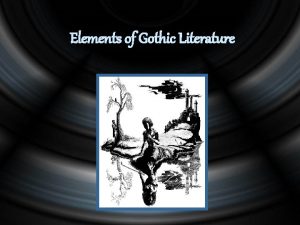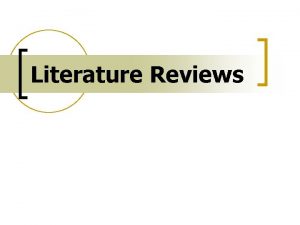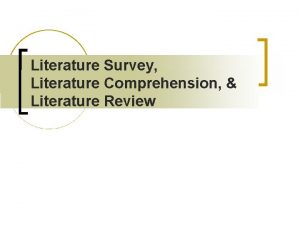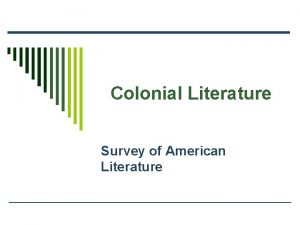English Language English Literature English Language English Language




































- Slides: 36

English Language English Literature

English Language

English Language- The Course • Component 1 - 20 th Century literature reading and creative prose writing (1 hour 45 mins and 40% of GCSE) • Component 2 - 19 th and 21 st century non-fiction reading and transactional/persuasive writing (2 hour exam and 60% of GCSE)

Component 1 20 th Century literature reading and creative prose writing (1 hour 45 mins and 40% of GCSE) Section A Reading (40 marks) -5 questions 2 Sections Section B Writing (40 marks) - 1 creative writing task

Section A (40 MARKS) AO 1 – Information Retrieval AO 1 2. 5% AO 2 – Writer’s Craft 5 marks AO 2 – Writer’s Craft AO 2 12. 5% 25 marks No AO 3 AO 4 – Evaluation AO 4 5% 10 marks

Section B (40 MARKS) • Choice of 4 narratives.

Component 2 19 th and 21 st century non-fiction reading and transactional/persuasive writing (2 hour exam and 60% of GCSE) 2 Sections Section A Reading (40 marks) -5 questions Section B Writing (40 marks) - 2 transactional writing tasks

Why 19 th and 21 st century texts? By reading texts from different periods and genres, you will gain an even better understanding of how writers’ views and ideas may differ over time.

Section A Texts: Two unseen non-fiction texts (about 900 -1200 words in total), one from the 19 th century and the other from the 21 st century. Exam questions and marks: Six reading questions (40 marks in total) AO 1 – Information Retrieval- (x 2) AO 2 – Writer’s Craft AO 3 – Comparing writer’s ideas and perspectives (x 2) AO 4 – Evaluation

Section A Texts: Two unseen non-fiction texts (about 900 -1200 words in total), one from the 19 th century and the other from the 21 st century. Exam questions and marks: Six reading questions (40 marks in total) Assessment Objectives Exam question(s) AO 1 To identify and interpret explicit A 1, A 3 and implicit information and ideas AO 2 To explain, comment and analyse how writers use language and structure to achieve effects and influence readers, using relevant terminology to support your views A 2 AO 3 To compare writers’ ideas and perspectives, as well as how these are conveyed, across two or more texts A 5, A 6 AO 4 To evaluate texts critically and support this with appropriate textual references A 4

Section B Writing 1 hour- 2 tasks (30 minutes per task)

Some General Writing Tips • • • Spend 5 minutes planning and 25 minutes writing each task. Work out PAF and consider how this will affect your writing before planning. Aim to write 2 sides for each task (4 -6 paragraphs). The quality of writing is the most important thing but students will be marked down for being too brief in their response. Use a wide range of vocabulary, varied sentence types and accurate and ambitious punctuation. Leave enough time to read through each piece, checking for basic errors and making improvements before the end of the exam. Use headings/ subheadings where appropriate but don’t draw images! If you are asked to write a letter, use the letter format (addresses, appropriate opening/ sign off) but don’t waste time thinking of an address; have one ready! Don’t make up unconvincing statistics! You don’t have to write as yourself unless the task specifies this.

The different writing styles that students may be asked to write in the exam. • • Formal letter Leaflet/guide Article Informal letter Report Review Speech/talk

How can I support my child? • This exam is completely unseen. Unlike literature, there won’t be any particular content to revise. The common misconception is that English language, therefore, can not be revised. It can, however, be prepared for very effectively: • Give your child a title for a narrative. Something generic like, The Storm or The Secret. Ask them to write a short narrative under timed conditions (they will have about 45 minutes in the exam). • Regularly encourage your child to read news articles. On-line websites such as The Guardian or I news are great: – https: //inews. co. uk/ – https: //www. theguardian. com/uk

How can I support my child? • Choose a transactional /persuasive writing type from the list and encourage your child to write in this format. You might want to ask them to write thank you letters to friends and family at Christmas, for example. Pages 179 -181 in the student planner gives further guidance on this. • Checking over your child’s work regularly literacy errors and having a dialogue with them about this will really help. • Ambitious and precise use of vocabulary is key. The creation of a word wall with definitions of ambitious and versatile words could really help. These could then be added to flashcards or post it notes to revise.

Exam board website – www. eduqas. co. uk Select English Language


Scroll down… Examiners reports Past papers and mark schemes K CLIC

https: //www. gcsepod. com/gcsepod_content/english/

English Literature

Literature Paper One 40% • The paper is 1 hour 45 minutes • Consists of 2 questions; Shakespeare and 19 th Century Prose • Section A: Romeo and Juliet Extract Question (30 + 4 marks) • Section B: A Christmas Carol Extract Question (30 marks)

Literature Paper Two 60% • The paper is 2 hours 15 minutes • Split into 3 sections: An Inspector Calls, Anthology Poetry, Unseen Poetry • Section A: An Inspector Calls essay question (30 + 4 marks) • Section B: Comparative Poetry – 2 poems taken from the anthology (30 marks) • Section C: Unseen Poetry thematic analysis question (24 marks) Comparative poetry question (8 marks)

What do I need to do to answer the questions effectively? • You need to make clear links to the question • Use RELEVANT quotations to back up your answer • Comment on the writer’s use of language, tone, structure (What does the writer want the reader to feel? Have they achieved this? What point is the writer making through the character? ) • Link back to the effect on the reader • Link to other parts of the text

How can I support my child? • Revision websites such as BBC Bitesize, Lit. Charts and Sparknotes are excellent tools for revision: • • http: //www. litcharts. com/ http: //www. bbc. co. uk/education/levels/z 98 jmp 3 http: //www. sparknotes. com/shakespeare/romeojuliet/ https: //www. audiopi. co. uk/subjects/english-literature/gcse/aqapoetry-anthology-power-and-conflict • The above sites include all of the literature texts and have opportunities to revise different elements of them including, plot, character, theme and context.

What should I be revising: Romeo and Juliet? Love Characters: • Romeo • Juliet • Tybalt • The Nurse • Benvolio • Mercutuio • Count Paris • Friar Lawrence • Lord Capulet Death Themes Loyalty Family Ties Tension Masculinity The Timeline of Events Innocence

What should I be revising: A Christmas Carol? Miserliness Characters: • Scrooge • Bob Cratchit • Fred • The 3 ghosts • Jacob Marley • Tiny Tim • The portly gentlemen Christmas Death Themes Hope Victorian Morality Tension Redemption The Timeline of Events

What should I be revising: An Inspector Calls? Tension Characters: • Inspector Goole • Arthur Birling • Sybil Birling • Eric Birling • Sheila Birling • Eva Smith / Daisy Renton • Gerald Croft Appearance vs. Reality Blame and Responsibility Themes Suicide The Timeline of Events Wealth and Morality

What should I be revising: Anthology Poetry? How should I be comparing? • Themes • Message • Speaker • Plot • Effect on the reader • TONE The power of nature Memories Themes Inner Conflict War Identity The power of nature

Unseen Poetry Question 1: Analytical Question (24 marks) • What is it about? • What are the writer’s intentions? • How does it make the reader feel? • Analyse language, form and structure Question 2: Comparison Question (8 marks) • One comparative paragraph • How does it link to the previous poem? (Subject matter/theme) • Is it the same or different? • Analyse the language and compare with the first poem • Effect on the reader

Revision Tips • • • Flashcards Flowcharts Mind maps Memory mountains Quotation Bursts Answer practise questions (look back over your mock exams, go on the AQA website at spec/past papers)

Flash Card example Take a topic or piece of information and break it into subtopics. E. g ACC – Redemption Digest the information in the subtopic and then condense it onto a flash card using key words and any exam rubric you know. You can do this with post-its and stick them around your room! ACC- Redemption:


Exam board website – www. aqa. org. uk Select Subjects

Select English

Scroll all the way down…

Past papers and mark schemes K CLIC
 Who is father of english tragedy
Who is father of english tragedy Eduqas english language and literature
Eduqas english language and literature Are english literature and language separate gcses
Are english literature and language separate gcses Unit 3 english language
Unit 3 english language English language a level eduqas
English language a level eduqas Ib english language and literature part 3
Ib english language and literature part 3 Igcse edexcel english literature paper 1
Igcse edexcel english literature paper 1 English literature wjec
English literature wjec Wjec past papers english literature a level
Wjec past papers english literature a level Critical realism
Critical realism Edexcel gcse english literature
Edexcel gcse english literature Victorian age introduction
Victorian age introduction Victorian period in english literature
Victorian period in english literature University wits in english literature
University wits in english literature Impact of renaissance on english literature
Impact of renaissance on english literature Feudal system definition
Feudal system definition Poem composition
Poem composition Cenaculo examples
Cenaculo examples Midwinter grahame davies
Midwinter grahame davies Parody poem definition
Parody poem definition Language book
Language book Medieval poetry in english literature
Medieval poetry in english literature The romantic period english literature
The romantic period english literature Importance of learning literature
Importance of learning literature Soundcloud download
Soundcloud download Ib english hl essay thesis examples
Ib english hl essay thesis examples Greek drama in english literature
Greek drama in english literature English literature paper 2
English literature paper 2 What is a foil in literature
What is a foil in literature Characteristics of medieval english literature
Characteristics of medieval english literature Aqa english literature nea prohibited texts
Aqa english literature nea prohibited texts Eduqas english literature past papers
Eduqas english literature past papers Wjec eduqas a level english literature
Wjec eduqas a level english literature Different ages of english literature
Different ages of english literature Wjec eduqas english literature a level
Wjec eduqas english literature a level Old english period
Old english period English literature paper inspector calls
English literature paper inspector calls

